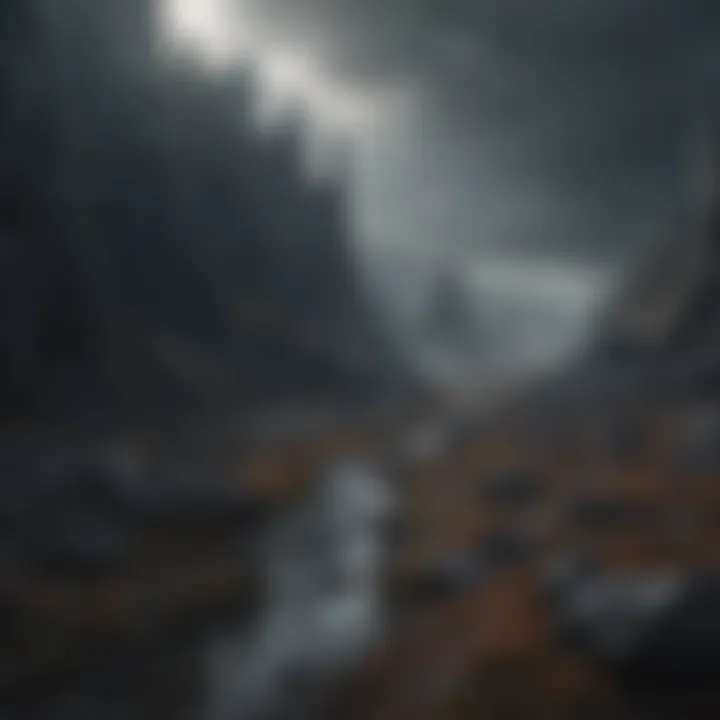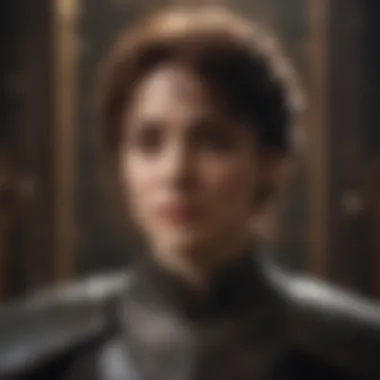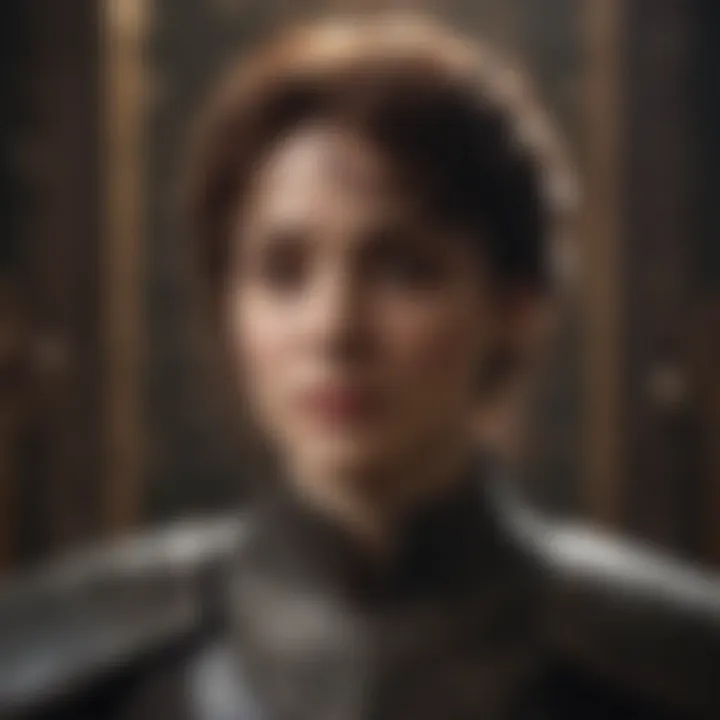The Prophetic Dreamer: Dreams in Game of Thrones


Intro
In the intricate world of Game of Thrones, dreams play a crucial role in weaving together the complex narratives and character arcs. The prophetic dreamer emerges as a theme that not only enriches the plot but also offers insight into the motivations and intentions of key characters. Understanding the significance of these dreams can enhance the viewer's appreciation of the show, allowing for a deeper analysis of events and characterizations.
The significance of dreams in this series goes beyond mere storytelling; they serve as narrative devices that foreshadow what is to come, providing clues that are often vital to the unfolding drama. As we delve into this exploration, we will highlight prominent characters, their dream experiences, and the themes and symbols present within these moments. By examining these factors, we aim to unearth the psychological implications of dreams in Game of Thrones and guide fans towards a richer understanding of Westeros.
Prelims to Prophetic Dreams
Understanding prophetic dreams is essential for grasping the deeper layers in the Game of Thrones narrative. Dreams in the series often serve as more than mere sleep-time illusions; they act as windows into the future, guiding pivotal character decisions. The exploration of prophetic dreams provides insight into how these nocturnal visions reflect the characters' internal struggles and the broader themes of fate and destiny that permeate the story.
This section lays the groundwork to appreciate the dynamic role dreams play in revealing plot points and character intentions. By dissecting various aspects of prophetic dreams, we can see how they are intertwined with the lore of Westeros. The importance of this topic cannot be overstated, as it enhances viewers' understanding of critical moments that shape the series’ trajectory. It is not just about what happens in the dream; it is about what those dreams signify for the characters and the global narrative.
Defining Prophetic Dreams
Prophetic dreams can be defined as visions experienced during sleep that are believed to predict future events or provide insight into personal dilemmas. In Game of Thrones, such dreams are often laden with symbolism, serving as narrative devices that foreshadow upcoming conflicts or reveal unseen truths. The multilayered nature of these dreams invites various interpretations, making them a rich subject for analysis.
In the context of the narrative, characters who experience prophetic dreams are often faced with significant decisions that will impact their lives and those around them. For instance, these dreams can catalyze character development or hint at their ultimate fate. This leads to a compelling examination of how dreams serve as tools for exploring personal and communal angst in the story.
Cultural Context of Dream Interpretation
The cultural background surrounding dream interpretation adds another layer to our understanding of prophetic dreams in Game of Thrones. Throughout history, societies have looked to dreams as messengers from the divine or as reflections of the subconscious mind. In various cultures, including the medieval European setting of Westeros, dreams were thought to carry significant meaning, often interpreted by figures like seers or shamans.
In Westeros, characters often consult with mystics or rely on their instincts derived from dreams. This highlights the reliance on intuition and the unseen forces that guide characters toward their destinies. Understanding these cultural contexts helps viewers appreciate the complex fabric of belief systems woven throughout the series.
"Dreams are the touchstones of our character." – Henry David Thoreau
By delving into the definitions and cultural implications of prophetic dreams, we can better appreciate their significance in storytelling and character development in Game of Thrones. The dream sequences are not just whimsical narratives; they are essential to understanding the motivations and fates of key characters.
Dreams in Game of Thrones
Dreams serve a critical role in the narrative structure of Game of Thrones, symbolizing both a pathway to understanding characters and an avenue for foreshadowing events. They are not merely whimsical fragments of sleep but rather profound reflections of the subconscious. Through dreams, viewers gain insight into the motivations and fears of key characters, enhancing the overall depth of the story. This section will delve into the importance of dreams in the series, examining their multifaceted role in character development and plot progression.
Overview of Dream Sequences
The Game of Thrones series is rich with dream sequences that reveal hidden truths and underscore pivotal moments in the storyline. These sequences often act as a bridge between reality and the fantastical elements of the show, creating an atmosphere where the extraordinary can intrude upon the ordinary. This blurring of lines prompts viewers to question what is real and what is a dream, further deepening the show's intricate lore.
Noteworthy dream sequences include Bran Stark's visions and Daenerys Targaryen's prophetic dreams. Each sequence contains layers of meaning that can be unpacked to reveal not just what the characters desire, but also what they fear. For instance, Daenerys's early dreams about fire and blood highlight her fierce ambition and the looming challenges she must face as a leader. By exploring such dreams, the audience becomes more attuned to the underlying themes of destiny, power, and sacrifice.
Key Characters with Prophetic Dreams
Several key characters in Game of Thrones experience prophetic dreams that serve to illuminate their journeys and choices. Bran Stark stands out as a quintessential prophetic dreamer. His dreams encapsulate the complicated history of Westeros, providing clues about future events and character fates. On the other hand, characters like Daenerys and Jon Snow also encounter dreams that reveal their deep-seated desires and fears, ultimately guiding their respective paths.
- Bran Stark: His role as the Three-Eyed Raven allows him to traverse time through visions, connecting past events with future consequences. This ability positions him as a crucial figure within the series, revealing hidden truths about the world.
- Daenerys Targaryen: Her dreams often revolve around dragons and themes of fire. They symbolize her heritage and the burden of legacy she carries. The dreams have a pivotal influence on her quest for power.
- Jon Snow: While his dreams are less overtly prophetic, they often reflect themes of identity and duty, challenging his sense of belonging and the harsh realities of leadership.
Through the lens of these characters, the series compels audiences to grapple with the intricate nature of dreams. Often, they highlight the tension between fate and free will, leaving viewers contemplating the thin veil between destiny and choice in a world where dreams can transform reality.
Visionary Dreams of Daenerys Targaryen


In the fabric of Game of Thrones, Daenerys Targaryen stands out as a character profoundly shaped by her dreams and visions. Her prophetic dreams provide a crucial understanding of her motivations, fears, and the overarching themes of the series. These dreams do not merely reflect her aspirations but serve as foreshadowing devices that advance the story. They play a significant role in her character development, revealing her journey from a displaced princess to a formidable leader. Understanding these dreams gives viewers insight into her internal struggles and motivations, positioning her as a pivotal figure in the series' narrative.
The House of the Undying Experience
Daenerys's journey in the House of the Undying marks a key moment in her story. This experience is laden with impactful prophetic visions. Upon entering, Daenerys is confronted with a series of surreal images and scenes, each dense with significance. Her visions include glimpses of the past, present, and possible futures, which emphasize her connection to the broader narrative of Game of Thrones.
One striking vision is that of her deceased brother, Viserys, which highlights her emotional attachment and conflicts regarding her family legacy. She sees a desolate throne room, hinting at the inevitable destruction of her aspirations if driven solely by vengeance. Moreover, visions of her dragons underscore her destiny. Each dragon signifies power, rebirth, and heritage, integral to her claim as the rightful ruler. Through these dreams, viewers witness the interplay between her desires and the harsh realities of her quest for power.
Symbolism of the Dragons
The dragons within Daenerys's dreams serve as multifaceted symbols. They are not merely beasts of war; rather, they represent her identity, strength, and the passage of the Targaryen bloodline. When Daenerys visualizes her dragons, she grapples with complex emotions ranging from pride to fear. The dragons symbolize her potential to reshape the world but also represent the heavy burden of responsibility.
Furthermore, their presence in her dreams highlights the fine line between empowerment and vulnerability. While they elevate her status as the Mother of Dragons, they also tether her to her past and the burdens of being a Targaryen. This duality enriches the narrative, providing depth to her motivations and ambitions.
In summary, Daenerys Targaryen’s visionary dreams shape her character arc and illuminate larger themes within Game of Thrones. Understanding these elements enhances appreciation of her role in the saga's complex storylines, revealing how dreams intricately thread through the narrative fabric of the series.
Bran Stark: The Seer and Dreamer
Bran Stark occupies a unique position in the world of Game of Thrones as a character whose journey intertwines with themes of prophecy, dreams, and the underlying currents of fate. His transformation from a simple boy into the Three-Eyed Raven exemplifies the profound significance of dreams in the narrative. Bran's experiences not only influence his fate but also serve as a lens through which audiences can better understand the mechanisms of prophecy in Westeros. This section delves into the nuances of Bran’s prophetic dreams and the implications they hold for the overall storyline.
Dreams as a Means of Prophecy
In Game of Thrones, dreams act as conduits for prophetic messages. Bran's dreams are etched with symbolic meaning and offer insights into future events. Early in the series, Bran has vivid dreams that foreshadow critical turns in the plot. During his coma, he experiences visions of the past and future, where he sees events that have not yet come to pass. These dreams highlight the theme of time fluidity in the series.
Bran's awakening is marked by his first significant prophetic dream, which reveals an ability to see through time and space. This capacity underscores his evolution as a seer. As he merges with the consciousness of the Three-Eyed Raven, his dreams become even more profound.
- Notable Prophetic Dreams:
- Bran’s vision of the fall of Winterfell.
- His foresight into the emergence of the White Walkers.
Such dreams are not mere figments of imagination; they act as warnings for themselves and others. His knowledge of upcoming challenges shapes the behavior of key characters around him, emphasizing that dreams can alter reality. In essence, dreams in Game of Thrones bridge personal experience and the tapestry of fate.
The Three-Eyed Raven's Influence
The Three-Eyed Raven is central to Bran's transformation and understanding of dreams. This enigmatic character guides Bran into a deeper awareness of his abilities. The lessons imparted by the Raven are crucial for comprehending visions and their meaning. Under the Raven's mentorship, Bran learns to harness his powers. He understands that dreams are multi-layered and require interpretation.
- Impact of the Three-Eyed Raven:
- Initiates Bran’s journey into the past and future.
- Teaches him the importance of knowledge in navigating the present.
As Bran progresses, he realizes that dreaming is not passive; it involves responsibility. His visions are not just glimpses of what awaits but points of guidance for himself and others. This realization adds a weight to his character that complicates his decisions and affirms the significance of dreams as both forewarning and insight.
"The past is already written. The ink is dry." - Bran Stark
The Role of Dreams in Foreshadowing
Dreams play a pivotal role in Game of Thrones, serving as a means of foreshadowing events that shape the story's direction. These dreams not only provide insight into a character’s psyche but also tease forthcoming plot developments. This section examines how dreams serve as prophetic symbols that connect various narrative threads across the series. Their importance extends beyond mere plot devices; they embody the complexities of the characters' journeys while enriching the intricate world of Westeros.
Connecting Past and Future Events


Dreams in Game of Thrones often create a bridge between the past and the future. A character's experiences, traumas, and memories are frequently reflected in their dreams, revealing unresolved conflicts that influence their decisions. For instance, Bran Stark's dreams delve into his family's past and the legacy of his house, hinting at future events in the series.
Key examples include:
- Bran's visions of the Night King and the White Walkers, which not only reveal past events but also foreshadow the impending threat to all of Westeros.
- Daenerys Targaryen's dream of the Iron Throne, symbolizing her determination and the challenges she will face in her quest for power.
These dreams guide characters as they navigate their choices. The reminder of past events in dreams ultimately shapes the decisions they make in their waking lives.
Character Decisions Influenced by Dreams
Characters in Game of Thrones often make critical decisions influenced by the dreams they experience. These dreams reflect their inner turmoil, fears, and aspirations, shaping their actions throughout the series.
- Example of Jon Snow: His dream of a long winter serves as a metaphor for the challenges he may face in unifying the North against a common foe. This internal conflict inspires his journey to become a leader and protector, emphasizing the importance of unity.
- Catelyn Stark's dream about her children underscores a mother's instinct to protect, driving her to take significant risks that alter her family's fate.
These dreams compel characters to confront their deepest fears and desires, prompting pivotal choices. The decisions made as a result can have profound consequences for their arcs and the story at large.
“Dreams are a way to explore not just what is, but what could be.”
Thus, the role of dreams in Game of Thrones serves as an essential narrative tool. They connect the themes of fate, choice, and memory, grounding the fantasy elements in very real human experiences. This intricate weave of dreams and decisions contributes significantly to the rich storytelling that defines the series.
Psychological Interpretation of Dreams
Understanding the psychological interpretation of dreams is vital to grasping their significance in Game of Thrones. Dreams function not only as narrative tools but also provide insight into the inner lives of characters. They illuminate the complexities faced by individuals navigating a world filled with political intrigue and personal sorrow. By analyzing dreams through a psychological lens, we uncover layers of meaning tied to personal growth, choices, and hidden desires.
When characters experience dreams, it often reflects their internal struggles. These reflections can reveal fears, hopes, and desires that may not be overtly expressed in their actions. The connection between a character's dream and their reality can enhance the viewer's understanding of the emotional stakes involved. Additionally, recognizing psychological themes in dreams helps to inform the narrative, as these themes often parallel the choices characters make in the waking world.
Dreams as Reflections of Internal Conflict
Dreams in Game of Thrones frequently act as mirrors for characters’ internal conflicts. The chaotic backdrop of war, betrayal, and death can lead individuals to experience deep psychological turmoil. Characters like Bran Stark and Daenerys Targaryen confront their inner demons through their dreams.
For instance, Bran's dreams as the Three-Eyed Raven reveal the burdens of knowledge. He struggles with the messages he receives, often questioning the morality of his powers. These dreams are not just visions of the past or future; they illustrate Bran's internal battle with identity and responsibility.
Similarly, Daenerys's dreams often churn with themes of loss and ambition. The weight of her family's legacy coupled with her desire for power manifests in her dreams, which are filled with dragons and destruction.
In this sense, dreams serve as psychological landscapes where conflicts are played out, setting the stage for personal growth or tragic downfalls.
Subconscious Desires Manifested in Dreams
Subconscious desires also find a voice through dreams in the narrative. Characters often grapple with their true wishes in a world where betrayal is common. The dreams that surface frequently reveal what characters seek at their core, often contrasting starkly with their day-to-day realities.
Take Jon Snow, whose struggles with loyalty and belonging are illustrated through his dreams. His desire to unite the North but also the conflicting emotions about his Stark and Targaryen heritage are represented in dream sequences.
As viewers, we witness how dreams surface desires that may be suppressed during waking hours. This offers a more nuanced portrayal of each character. By engaging with their dreams, characters in Game of Thrones explore what they truly want versus what they believe they should want.
"Dreams are not what you see in sleep; they are what you see in waking life."
Ultimately, examining the psychological interpretation of dreams enriches the narrative by offering a lens through which we can understand character motivations and developments. By unfolding layers of meaning in dreams, we are better equipped to appreciate the intricate and often tumultuous journeys of characters within the realm of Game of Thrones.
Thematic Significance of Dreams


Dreams hold a unique place in the narrative structure of Game of Thrones. They are not mere projections of the subconscious; they serve as significant thematic elements that deepen the story's complexity. The importance of dreams is underscored by their ability to reveal the inner workings of characters, foreshadow events, and highlight the disparate forces of fate and choice.
Through dreams, the show captures the notion that what lies beneath the surface can profoundly influence reality. Characters oscillate between empowerment and vulnerability, with dreams often shedding light on their fears, desires, and moral dilemmas. This duality provides rich material for exploration, as audiences witness how dreams shape paths and decisions.
Dreams and Fate in Westeros
In Westeros, the interplay between dreams and fate is particularly poignant. Dreams often encapsulate prophecies, hinting at future occurrences that characters are either unable or unwilling to comprehend fully. For instance, Daenerys Targaryen's dreams forecast her tumultuous rise to power and the dangers that lurk ahead.
The idea of fate is far from straightforward. Instead, it raises critical questions about agency. Characters in Game of Thrones are frequently caught in a web of destiny yet strive to forge their own paths. The dreams act as a mirror to this struggle, emphasizing that while fate may be predetermined, actions taken in wakefulness still have profound consequences. Dreams can be seen as the summary of individual desires intertwined with inevitable fate, thus informing pivotal decisions in the lives of characters.
The recurring theme of fate versus free will serves as a cornerstone in Game of Thrones, with dreams highlighting the often tenuous balance between the two.
Empowerment and Vulnerability in Dreams
Dreams in Game of Thrones serve to illustrate both empowerment and vulnerability. Characters find a sense of agency in their dreams, engaging with desires that are often suppressed in their waking lives. This space allows them to explore possibilities that may otherwise be denied. For example, Bran Stark's dreams of flying symbolize not only his longing for freedom but also his deeper connection to the complex history of Westeros.
However, dreams also expose vulnerabilities. The images conjured reflect not just aspirations but fears that haunt the dreamers. The stark contrast between dreams of power and the harsh realities of life creates a profound narrative layer. For instance, visions experienced by characters often unravel their psychological depth, illuminating weaknesses or buried truths.
Contrasts: Reality vs. Dream
The exploration of contrasts between reality and dream serves as a central theme in Game of Thrones, illuminating deeper meanings behind the characters' experiences. Dreams often reflect subconscious thoughts, fears, or desires, sometimes misguiding or clarifying a character’s intentions. In the narrative framework of the series, prophetic dreams create an intricate dance between what characters perceive and what is objectively true. Understanding this distinction can enhance the viewer's grasp of the unfolding story.
Moments of Clarity vs. Illusions
Dreams in Game of Thrones frequently provide crucial moments of clarity amid the chaos of reality. For example, Bran Stark’s visions offer him insights into past and future events. These moments are not merely narrative tools; they offer viewers a deeper connection to the characters’ internal struggles. While often interpreted as mere illusions, these dreams represent a profound space where true intentions can manifest.
"Dreams have a way of revealing truths we often fail to see in our waking lives."
Conversely, characters such as Daenerys experience dreams that can mislead. Her visions in the House of the Undying convey symbolic errors that complicate her path toward power. These illusions blur the line between reality and aspirations, reflecting the intricate layers of her character development. The dream sequences thus act as both warnings and insightful moments, enriching the narrative while prompting analysis of their real-world impacts on characters’ decisions.
Impact on Character Progression
The dichotomy between dreams and reality also significantly impacts character progression within the series. Prophetic dreams reveal insight into character arcs, exposing vulnerabilities and manifesting inner conflicts. Bran’s journey is defined by his acceptance and understanding of his role as a seer. His dreams push him toward embracing his identity while also exhibiting the weight of knowledge.
Characters are often challenged by the conflicting nature of their dreams and reality. For instance, Catelyn Stark’s dreams of warning foreshadow tragic events. Her successive dream experiences recur throughout the series, influencing her decisions and setting pivotal narratives into motion. These contrasting elements drive transformation and often mark a turning point for many characters.
The narrative suggests that while dreams can offer guidance, they can also lead to misunderstandings and poor choices. Viewing these contrasts helps viewers engage more deeply with the complexities of the plot, linking character motivations with the dream symbolism prevalent in the series.
Epilogue: Reflection on Prophetic Dreaming
As we reach the end of this exploration into prophetic dreaming within the world of Game of Thrones, it is crucial to reflect on the multifaceted significance of dreams in the series. Dreams serve not only as narrative tools but also as gateways into the psyche of characters. The prophetic elements inherent in these dreams offer an avenue through which viewers can gauge motivations and future actions of key figures in the series.
Dreams often function to connect thematic threads across vast distances of time and space in Westeros. They are not mere whims of the subconscious but rather manifestations of deeper truths. For example, Daenerys’s visions guide her decisions and reinforce her identity, while Bran’s prophetic dreams unravel the mystery of his own existence and the fate of the realm.
The weight carried by these dream sequences can't be understated. They provide insight into the conflicting desires and fears of characters facing a tumultuous world. Understanding this aspect promotes a richer engagement with the story. In short, the impact of prophetic dreaming is profound, affecting both character development and audience interpretation.
The Lasting Impact of Dreams
The dreams portrayed in Game of Thrones, far from ephemeral trifles, serve as crucial plot devices. Their influence extends beyond the characters who dream them. Through dreams, the dymanic nature of fate, choice, and personal growth is revealed. For example, they illuminate the consequences of actions that characters may take.
- Influence on Major Events: Dreams often foreshadow critical moments, acting as harbingers of things to come. This invites viewers to reassess previous actions and reactions.
- Psychological Depth: Characters' dreams reveal their struggles and hopes. For instance, Jon Snow’s dreams highlight his identity crisis and his connection to the past.
- Thematic Unity: Themes like destiny, sacrifice, and legacy resonate through dream motifs. They bring together characters' narratives, allowing for a more cohesive understanding of their journeys.
Future Implications in Game of Thrones Lore
The implications of prophetic dreaming extend beyond the immediate narrative of Game of Thrones. As the lore evolves, these dreams offer fertile ground for future storytelling. The exploration of dreams opens potential for new character arcs and conflicts.
- Expanded Universe: As Game of Thrones continues to inspire new content, future stories can further elaborate on dreams as an integral part of the narrative.
- Character Continuation: Characters may return with unresolved dreams, creating new tensions.
- Broader Themes: The dream narrative can expand to address broader themes of power, revenge, and morality within the lore.
In summary, the symbolic weight of dreams in Game of Thrones continues to reverberate deep within the overarching storyline. They serve as both reminders of the past and harbingers of what is to come, shaping character destinies and enhancing the intricacies of the narrative landscape.



